Busan fest programmer lists why Pinoy shorts should be ‘nurtured’

Park Sung-ho (right), Busan International Film Festival programmer, with Ed Cabagnot, director and consultant of The Manila Film Festival —MARINEL CRUZ
Short films are undervalued and, therefore, should be promoted, according to South Korean festival programmer Park Sung-ho, who will be serving as one of the jurors of this year’s edition of The Manila Film Festival (TMFF).
The festival features the works of eight student short filmmakers, who received a grant of P150,000 each. The short films of the following professional directors are also screened: Pepe Diokno, Sigrid Andrea Bernardo, Dwein Baltazar and JP Habac.
“I’m happy that the festival is focused on shorts now. They serve as an important platform for young filmmakers who want to prove that they are capable of eventually becoming full-length filmmakers. But it doesn’t mean that a short film is just a step in between apprenticeship and becoming a professional,” said Park, who is the Asian cinema programmer of the Busan International Film Festival.
“Short films also have their own beauty. I hope for the Filipino audience to be more exposed to this kind of art. Interestingly, for example, in Korea, even short films are theatrically released nowadays,” he told reporters over lunch during the weekend.
“Often, short films are undervalued. It’s important for film festivals to nurture them. I think it’s the same with you journalists. If you haven’t written anything, nobody will hire you as a journalist. It’s all about building up your portfolio to become full-time professionals. Short filmmaking is also a very important platform.”
Park will be sharing jury duties with Bianca Balbuena, head of Kroma Entertainment’s Anima Studios; Neil Daza, director and cinematographer; Coreen “Monster” Jimenez, film producer; and Eduardo “Dodo” Dayao, writer, screenwriter and director.
‘Aesthetics of a short film’
“The thing about the short film is that it’s not just a short version of a full length,” said academician Ed Cabagnot, who is also TMFF director and consultant. “The aesthetics of a short film are totally different. You are trying to build a world with very interesting characters in a limited time. I think the crafting of a short film is more difficult.”
Cabagnot said the decision for TMFF to highlight short films was a reaction to last year’s edition. “They held a version of this last year. When they asked me to help out for this year, I asked what the previous people did. I discovered that they gave a certain amount of money, very small, to create full-lengths for a period of three and a half months. And so, I said, ‘If I’m going to help you, we cannot do the same. Why don’t we just get the money that was supposed to do full-lengths and look at projects being done by students because we’re always pressed for time?’”
Cabagnot is one of the founding members of the Cinemalaya Philippine Independent Film Festival.
For Park, festivals in the Philippines are “the frontiers in Asia.” He explained: “You have a long history of cinema. The Philippines [through Cinemalaya] is the first country in Southeast Asia to be discovered by other festivals in the world. Interestingly, the festivals here are actually producing the films, not just showcasing them. What you do here is not the same for most of the festivals around the world.”
Park was referring to the fact that most local film festivals have seed-granting schemes like Cinemalaya and QCinema, as well as the now-defunct Cinema One Originals and Sinag Maynila.
Park worked full-time for the Busan IFF from 2007 to 2013, where he served as program coordinator for Asian cinema and manager for the Asian Film Academy. For several years, he also worked for various film festivals as a buyer, programmer, juror and advisor. Now based in Cambodia, Park helps promote Cambodian and Southeast Asian cinema globally.
He explained that while the Busan IFF also has funding schemes, “We don’t actually work like Manila. We no longer give grants for shorts. Our budget was reduced during the COVID-19 pandemic,” he pointed out.
Park took up film in college where he learned mostly European, Hollywood and Korean classics. “I wasn’t exposed to Asian cinema until I was in my late 20s, it’s when I started working for the Busan IFF. In 2008, Kim Ji-seok, who was the guardian angel of Asian cinema, asked me to join as program manager. He had deep appreciation for all Asian cinemas. He passed away in Cannes seven years ago,” Park recalled.
Special features
In the last 20 years, the Busan IFF has already created special features on Filipino cinema twice. “It’s where I learned a lot about Kidlat Tahimik and Lav Diaz. Brillante Mendoza was already famous in European film festivals so I had to see his work, too,” Park said, adding that Marlon Rivera’s comedy, “Ang Babae sa Septic Tank,” was one of his all-time favorites. “It’s a sarcastic self-reflection and it’s also about the film industry. It drives me crazy. I’ve watched it several times. It pokes fun at filmmaking and film festivals.”
When asked what his hopes for TMFF are, Park said: “Of course I want it to be successful, and by this, I mean I want people to come see the films. Honestly, I think the number of audience members is very important. How to encourage people to come to the cinemas has long been a trending topic in film festivals during the post-COVID era.”
Meanwhile, Cabagnot shared his observation on the Busan IFF: “In the past 10 years, it had already become too difficult to get tickets that even festival guests had to line up. The community started to own the Busan IFF. In fact, as early as the first days of October, people from Seoul would bring their families there and fill up the hotels. That’s also my hope for us—for this community to own the Manila Film Festival. That’s what happened to Cinemalaya.”